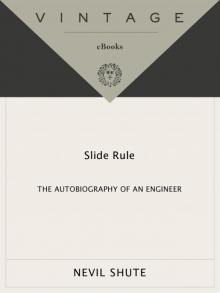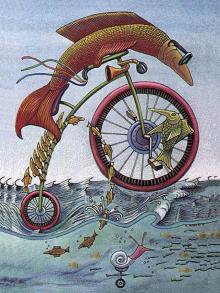- Home
- Nevil Shute
The Breaking Wave Page 8
The Breaking Wave Read online
Page 8
Commander Cartwright was a very angry man. His training classes were standing idle and laughing at each failure; clearly their morale was suffering. They would have little confidence after a show like this that they could hit an aeroplane, if all the experts couldn’t. It was intolerable that they should have to witness an exhibition of this sort that brought his training effort into ridicule.
His instructor, C.P.O. Waters, who had had ten years of experience upon the grid, sidled up to him. “I got a Wren down there that could hit that thing,” he said out of the corner of his mouth. “That one what hit the sleeve on Monday. She’s a natural, she is. She could hit that, sir.”
The officer’s eyes gleamed. “Think she could?”
“I think so, sir. What’s it doing? Hundred and eighty knots?”
“About that, I should say.”
“She could hit it, sir. Ask if some of the training class can’t have a go, and leave the rest to me.”
Commander Cartwright went up to the observation tower, caught the eyes of the Captain of H.M.S. Excellent, and saluted smartly. “We have three courses waiting down on the grid, sir, each for their final day of eyeshooting. Could we save time in getting out another aircraft by letting them shoot at this?”
The Captain said, “I think that’s quite a good idea. It would be interesting to see the comparison, too.” The Director of the Gunnery Division said, “I don’t think you can expect much from that.” The First Sea Lord said, “I have no objection. What time is it now? I must be off by half past four.”
Down on the grid the Chief said, “Here you, Leading Wren Prentice. On the Oerlikon.” She stepped forward, bursting with importance, and slipped her shoulders into the half rings. The Chief pulled the strap behind her shoulders and made it fast for her. “Take it easy,” he said quietly. “Try it first about a hundred and eighty knots, ’n if that don’t work, feel it up towards two hundred, like you been taught. Now wait till I tell you to fire.”
Janet grinned at him. “Okay, Chief.”
Up on the observation tower where the high brass were congregated the vice-admiral who was A.C.N.S.(W.) looked down to the Oerlikon. “What’s that—a Wren?”
By his side Commander Cartwright said, “It’s the eyeshooting class for Qualified Ordnance Wrens, sir. Ladies first.”
Down on the grid Janet moved up on the circumferential steps behind her as she depressed the Oerlikon to the approaching target. A hundred and eighty knots, fairly near the outer ring but two-thirds in from that because it was diagonal, flying a little below the centre because of the range. She had never had the slightest difficulty with this; it all seemed commonsense to her. By her side the old Chief said quietly, “Wait for it. Remember, don’t look at the tracer, just keep looking at the sight, and mind what I told you. Wait for it.”
She had it fair and square between the rings at about four o’clock, exactly as she wanted it. The little target glider grew quickly larger.
“Now—fire!”
She pressed the grip and the gun started shaking rhythmically, and the noise was great, and the smoke of cordite was all around her. She had the little glider held fixed in her sight exactly as she wanted it; she swung her body across and down to keep it there and the gun swung slowly with her. Deliberately she felt the target back towards the outer ring, moving it very slowly, anticipating the violent throbbing of the gun, bracing herself to master this wild thing that she had started with her grip.
She was exultant. This was really living; it was fun!
And suddenly there were two flashes on the little glider, one on the wing and one on the body. It rolled over on its back and one of the wings came off and began to flutter down. The Chief roared in her ear, “Cease Fire!”
She released her grip and the clamour of the gun stopped, and she stood watching with the smoke all around her. The glider was plunging violently and wildly in the air at the end of its mile-length of cable, in fantastically irregular flight. Then the cable suddenly went slack as the observer in the towing aircraft cut it free, and the target fell in spinning confusion into the sea with a small splash.
On the grid the class were cheering wildly. The Chief released Janet from the back strap; reaction was upon her and she was trembling as if she still fired the gun. From the ready-use ammunition locker the Chief produced another coconut; she took it from him, laughing.
Up on the observation tower the range officer said drily to his Captain, “There’s something to be said for the old methods, after all.”
His Captain said, “Oh, certainly. But it’s exceptional. She’s probably a Senior Wrangler in civil life, and teaches trigonometry.”
The higher admirals were perfectly delighted, especially the Fifth Sea Lord. “There, D.N.O.—and you, D.G.D. What about it? Beaten by a girl with five bob’s worth of sights upon the gun! I haven’t had an afternoon like this for years!”
Somebody said resentfully, “She’s probably a crack shot in civil life, sir.”
The First Sea Lord said, “Well, I should like to know about that. Let’s have her up here for a minute.”
An R.N.V.R. officer was despatched down to the grid at the double to fetch C.P.O. Waters and Leading Wren Prentice to the Presence; Janet fumbled with her coconut and gave it to May Spikins to look after for her, put her hat on straight, and went with the warrant officer up to the tower. Here she was passed quickly to Commander Cartwright, by him to the Captain of H.M.S. Excellent, and by him to the First Sea Lord. She looked at him nervously, a red-faced old gentleman with heavy gold braid rings upon his cuff that seemed to go right up to the elbow, and a fruit salad of medal ribbons on his chest. She was still trembling from the clamour of the gun, from reaction, and from fright.
He said kindly, “That was very good shooting, young lady. I congratulate you. Had you done much shooting before you joined the Service?”
She said, “I had fired a shot-gun, sir. Only twice.”
“Have you done much shooting since you joined?”
She hesitated, because at Ford it was against the regulations for Wrens to fly. Then she decided it was better to tell the truth. “I was in the Fleet Air Arm before coming here,” she said. “They used to take us up sometimes to test the observer’s Lewis or Browning by firing it.”
“What did you fire at? Something in the sea?”
“Yes, sir. A bit of wood or seaweed—anything.”
All the officers were studying her. The First Sea Lord asked, “What are you in civil life?”
She said awkwardly, “Well, sir—I wasn’t anything. I mean, I was at school.”
The Captain of Excellent asked, “What were you best at, at school?”
She hesitated. “Well, I liked Latin best, I think.” It seemed a pretty crackpot sort of question to her, and it must have been, because one or two of them laughed.
The First Sea Lord asked, “Did you have any difficulty in learning eyeshooting?”
“No, sir.” She had a natural flair for it. All the rest of her class had been much puzzled by it, and she had spent an hour trying to make May Spikins see what seemed so obvious to her. “I just did what the Chief taught us.”
That brought in Chief Petty Officer Waters. The admiral asked him, “Is this Wren exceptional, Chief?”
He answered stiffly, “She’s better than the general run, sir. I’d say that she’s a natural good shot.”
“That’s why you put her on to shoot?”
“Yes, sir.”
Somebody else asked, “What are the Ordnance Wrens like, in general, compared with the ratings?”
He said, “They’re better, sir—no doubt of that. Of course, they’re better educated, mostly, than the called up classes that we’re getting in now.”
The First Sea Lord said, “Well, I congratulate you on this young lady, Chief. It was very good shooting.” The petty officer beamed with pleasure, storing up each word in a retentive memory, to retail to me in the end eight years later.
He withdrew with Ja
net and they left the tower together and went down to the class on the grid. He sent her back in to the ranks, and called the squad to attention. “Now look here, you Wrens,” he said in measured tones. “I just been congratulated by the First Sea Lord himself, on account of what Leading Wren Prentice, No. 3 in the front rank, just did. Now you see what can be done with eyeshooting if you troubles to learn how to do it. What Leading Wren Prentice did any one of you can do, if you takes the trouble. Otherwise you better change your category and go for a cook. Now, stand easy.”
They all bent towards Janet. “Did you see the First Sea Lord? What did he say?”
“I saw him,” she told them. “He asked me what I did before I joined up, and I said I didn’t do anything. And then the Captain of Excellent asked what I was best at, at school, and I said, Latin. I think they’re all crackers, if you ask me. Mad as March hares. No wonder they can’t hit the bloody aeroplane.”
I know she said that, because May Spikins told me all about that day when we talked in her council house upon the new estate at Harlow. May Cunningham she was by that time, with a little boy two years old and a baby of six months; her husband was a clerk in the municipal offices at Enfield and he was away at work when I called to see her, in 1950. Warrant Officer Finch had told me about her when I went to see him about Bill, and I motored down to see May Spikins because I thought that she might be in touch with Janet Prentice, or at least know what had happened to her. But she knew nothing; they had not met or corresponded since Janet left the Service. She had known Bill slightly as Janet’s boy friend, and when I told her that I was his brother from Australia she loosened up and invited me into the parlour, and made a pot of tea, and we talked for a long time of those far-off weeks and day at Beaulieu, before “Overlord,” before the balloon went up.
I know she said that, because she was a very outspoken girl in those days, and when May Spikins told me that I knew that it was true, because the words were exactly the words that Leading Wren Prentice would have used. It was probably this quality of character and ability to express herself in a masculine way that made the ratings in the invasion fleet afraid of her displeasure; to be ticked off by a Wren who used all the vigour and language of a petty officer was intimidating, and there was a certain feminine ruthlessness about her that made them feel she would not hesitate to implement her threats.
I felt something of the same quality in her when I spent the Sunday with her and Bill, at Lymington, in April 1944. There was a forthrightness about her, a directness of speech and community of experience that was infinitely restful to men strained to the limit in those weeks before the invasion. She was obviously very good for Bill. He didn’t have to put on an act for her. She would have laughed and been embarrassed if he had given her flowers, and by then he was too tired and preoccupied with his trips over to the other side to think of giving anything to anybody. It was she who produced the motor boat that day for our run down the river to the Solent. It was a little grey painted naval boat fifteen or sixteen feet long, a fishing boat that had been taken over by the Navy, I should think. She had it at the quay by the Ship Inn when I got back from Beaulieu aerodrome at about half past ten. The W.A.A.F. driver took me to the quay and there was Bill in battledress and gumboots with his dog, and Janet Prentice in rather dirty blue serge slacks, and gumboots, and a blue jersey, and a greasy duffle coat. I dismissed my car and went down to the boat.
Bill introduced me, and I shook hands with the girl. She looked me up and down smiling. “Bill’s got an oily for you,” she said, “but I don’t know about your clothes. I’m afraid this boat’s in a bit of a muck.” There was a pad of dirty cotton waste upon the engine casing by her side, and she wiped the thwart with it.
The uniform that I was wearing was my oldest, threadbare with much cleaning and still marked with oil stains that would not come out. “I’ll be right,” I said. “Don’t bother about me.”
“I’m afraid you’ll get that lovely uniform all dirty,” she said. “Put on the oily anyway; it may be a bit wet outside, if we go round to Keyhaven.”
“Tide’s flooding and there’s not much wind,” Bill said. “It won’t be bad.”
She turned to crank the engine. I offered to do it for her, but she refused, making me feel that I had done the wrong thing. “She kicks back if you’re not careful,” she said. “One of the ratings broke his arm on her the other day, but she’s all right when you know her. I’ll do her myself.” She tickled the old carburettor, bent to the handle, and gave the heavy flywheel a vigorous heave over; she was evidently a very powerful girl. The engine began thumping away beneath the box, and she moved to the stern and cast the stern rope off and drew it in, dripping with sea water, and coiled it expertly. Bill cast off from the bow and the girl took the tiller, kicked the lever forward with her foot, and we moved off down the river.
There were no civilian boats or yachts afloat upon the south coast at that time, but the river was full of landing craft, box-like, grey, painted things of steel with ramps to let down at the bow, with diesel engines thumping away inside them to charge batteries as they lay moored bow and stern to the buoys, with soiled white ensigns drooping at the stern, with bored ratings fishing over the side and staring at us as we threaded our way past. I did not know the function or the name of any of these ships, but Janet and Bill knew them all and told me shortly what they were, and what they were to do, as we chugged past. This, was the L.C.T. Mark 4, the standard tank landing craft, British built and the most common of the lot. This, was the Mark 5, American designed and built and shipped to England on the decks of ships, an unpleasant and relatively unseaworthy little craft that would go in first in the assault, bearing the Sherman tanks that were to swim ashore, and the work tanks, the armoured vehicles R.E. that were to clear the beach of obstacles so that the landing craft could come in safely, and detonate the mines, and bridge the trenches in the sandhills on the other side. This, was an obsolete mark of L.C.T. converted as a rocket ship to fire a salvo of nine hundred rounds at one push of the button to blast the shore defences. This, bristling with Bofors guns and Oerlikons, was a gunnery support craft, manned and commanded by Marines. This fast powerful open landing craft coming up the river towards us at speed, manned by American sailors in white, upturned caps, and with the name Dirtie Girtie proudly painted on her bow, was an L.C.V.P., an American infantry landing craft so powerful and well designed that ratings with a minimum of training could handle her. All these were known to Janet and Bill, but there were other things afloat upon the Solent that they knew nothing of, great box-like things of concrete bigger than a cross-Channel steamer floating moored or building on the shore, things like a monstrous reel of cotton fifty or sixty feet in diameter floating on the water, flat rafts with grotesque girders sticking up into the air.
Once Janet said in a low tone, “I wonder what the hell they’re going to do with that?” but neither of us answered her. Bill may have known; if so, he kept his mouth shut, as was right. Each of us had our own secrets at that time, our own part in the affair, dominating our minds. I asked once casually, “Do you get many German aircraft over here, having a look?” It was always possible that something might have slipped in my office, some information that we might have missed, something the locals might know about that we did not.
The girl grinned and said, “We’ve not had a Jerry over here for weeks—two months, I should think. I can’t think what he’s up to. You’d think that he’d be over every day, photographing all this.”
“You’d think so,” I replied idly. It was all right. The fighter patrols organised from my office were on top of the Germans on the other side of the Channel; nothing had slipped past us. Our combat losses might be averaging three machines a day on these security patrols alone, but nothing had got past us save one Messerschmitt 110 ten days before, and that one we had got on his way home. The Germans probably knew very little still of what was massing up against them in the Solent.
We reached the end of the r
iver and the West Solent lay before us, blue and shimmering in the April sun. Bill had moved to the stern beside the girl. I turned to say something to them, but they were both looking over to the shore of the Isle of Wight, four miles across the sea. Bill said, “That Sherman’s still on the beach.”
“They’re not bothering about it,” she said. “They can’t tow it up the cliff.”
I asked, “What’s that?”
They pointed to the beach on the far side of the channel. “That tank up at the head of the beach, see it? Under the cliff. They were doing practice landings from an L.C.T. on that bit of beach. That Sherman was wading ashore but it went down in a hole.”
The girl turned to me. “It went right under water,” she explained. “A chap got drowned in it—the driver.”
It was a simple statement of fact, unemotional.
Bill said, “They could salve it if they took a bit of trouble. They could bring in an L.C.T. and tow it back on board and take it somewhere.”
“It’s no good,” the girl said. “Viola heard about it from a Pongo. When it went under, the water got in to the engine and wrecked it—blew off all the cylinder heads. It’s not worth bothering about. They took the gun off it.”
“When did this happen?” I asked.
“About five weeks ago,” said Bill. He grinned at the girl, and said nonchalantly, “That’s how I met Janet.”
I learned a good bit about what had happened on that day when I met Viola Dawson six years later, and Warrant Officer Finch told me a little more when I was talking to him about Bill. It was in March, perhaps about the twentieth of the month. Janet had been in Mastodon for about nine months. When she went there she had thought that she was going to a base of Coastal Forces to service guns on motor torpedo boats; security had masked the fact that she was destined for the build-up to the invasion of Normandy.

 On the Beach
On the Beach Slide Rule
Slide Rule A Town Like Alice
A Town Like Alice The Far Country
The Far Country Pied Piper
Pied Piper Round the Bend
Round the Bend An Old Captivity
An Old Captivity Mysterious Aviator
Mysterious Aviator The Breaking Wave
The Breaking Wave Marazan
Marazan Lonely Road
Lonely Road Pastoral
Pastoral No Highway
No Highway Stephen Morris and Pilotage
Stephen Morris and Pilotage Complete Works of Nevil Shute
Complete Works of Nevil Shute Most Secret
Most Secret Beyond the Black Stump
Beyond the Black Stump The Rainbow and the Rose
The Rainbow and the Rose The Chequer Board
The Chequer Board Trustee From the Toolroom
Trustee From the Toolroom Ordeal
Ordeal Stephen Morris
Stephen Morris